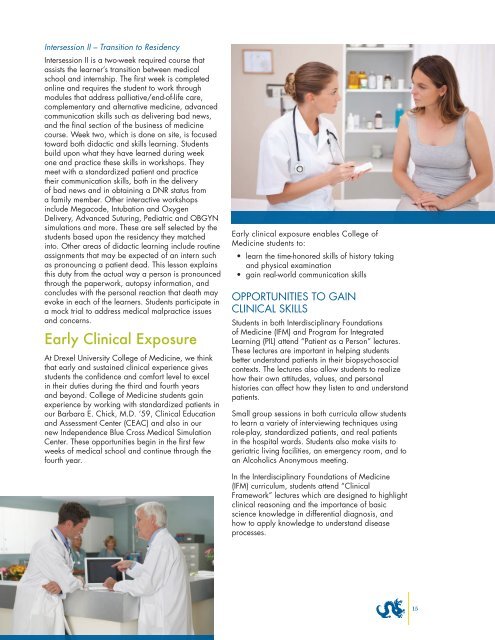Download Student Information 2012-2013 - Drexel University ...
Download Student Information 2012-2013 - Drexel University ...
Download Student Information 2012-2013 - Drexel University ...
You also want an ePaper? Increase the reach of your titles
YUMPU automatically turns print PDFs into web optimized ePapers that Google loves.
Intersession II – Transition to Residency<br />
Intersession II is a two-week required course that<br />
assists the learner’s transition between medical<br />
school and internship. The first week is completed<br />
online and requires the student to work through<br />
modules that address palliative/end-of-life care,<br />
complementary and alternative medicine, advanced<br />
communication skills such as delivering bad news,<br />
and the final section of the business of medicine<br />
course. Week two, which is done on site, is focused<br />
toward both didactic and skills learning. <strong>Student</strong>s<br />
build upon what they have learned during week<br />
one and practice these skills in workshops. They<br />
meet with a standardized patient and practice<br />
their communication skills, both in the delivery<br />
of bad news and in obtaining a DnR status from<br />
a family member. Other interactive workshops<br />
include Megacode, Intubation and Oxygen<br />
Delivery, Advanced Suturing, Pediatric and OBgYn<br />
simulations and more. These are self selected by the<br />
students based upon the residency they matched<br />
into. Other areas of didactic learning include routine<br />
assignments that may be expected of an intern such<br />
as pronouncing a patient dead. This lesson explains<br />
this duty from the actual way a person is pronounced<br />
through the paperwork, autopsy information, and<br />
concludes with the personal reaction that death may<br />
evoke in each of the learners. <strong>Student</strong>s participate in<br />
a mock trial to address medical malpractice issues<br />
and concerns.<br />
Early Clinical Exposure<br />
At <strong>Drexel</strong> <strong>University</strong> College of Medicine, we think<br />
that early and sustained clinical experience gives<br />
students the confidence and comfort level to excel<br />
in their duties during the third and fourth years<br />
and beyond. College of Medicine students gain<br />
experience by working with standardized patients in<br />
our Barbara E. Chick, M.D. ‘59, Clinical Education<br />
and Assessment Center (CEAC) and also in our<br />
new Independence Blue Cross Medical Simulation<br />
Center. These opportunities begin in the first few<br />
weeks of medical school and continue through the<br />
fourth year.<br />
Early clinical exposure enables College of<br />
Medicine students to:<br />
• learn the time-honored skills of history taking<br />
and physical examination<br />
• gain real-world communication skills<br />
OPPORTUnITIES TO gAIn<br />
CLInICAL SKILLS<br />
<strong>Student</strong>s in both Interdisciplinary Foundations<br />
of Medicine (IFM) and Program for Integrated<br />
Learning (PIL) attend “Patient as a Person” lectures.<br />
These lectures are important in helping students<br />
better understand patients in their biopsychosocial<br />
contexts. The lectures also allow students to realize<br />
how their own attitudes, values, and personal<br />
histories can affect how they listen to and understand<br />
patients.<br />
Small group sessions in both curricula allow students<br />
to learn a variety of interviewing techniques using<br />
role-play, standardized patients, and real patients<br />
in the hospital wards. <strong>Student</strong>s also make visits to<br />
geriatric living facilities, an emergency room, and to<br />
an Alcoholics Anonymous meeting.<br />
In the Interdisciplinary Foundations of Medicine<br />
(IFM) curriculum, students attend “Clinical<br />
Framework” lectures which are designed to highlight<br />
clinical reasoning and the importance of basic<br />
science knowledge in differential diagnosis, and<br />
how to apply knowledge to understand disease<br />
processes.<br />
15

















